Contents
Market Overview
Macro Review
Markets will be reminded of the Fed’s outcome-based framework following weak Nonfarm Payrolls. Yellen may have accidentally moved markets earlier this week, but the degree of Fedspeak dialing back tapering expectations has been noteworthy. ADP Employment is often a poor predictor of the NFP report, but this was the second largest miss relative to expectations since 1996 (or since Bloomberg collated median survey results). The Fed’s principal concern is of course stability and employment, yet the jumbled tone and miscommunication of Fedspeakers reached a new high this week. The typical cohort of FOMC hawks instead pushed back on the tapering timetable, perhaps most interestingly from Rosengren as a 2022 dot, although Bostic (2023 dot) sang from the same hymn sheet. This dilutes the message from Kaplan who reiterated his position on three occasions over the past seven days, although he will remain a non-voter until 2022. Elsewhere, the Fed’s semi-annual financial stability report highlighted that risk markets could exacerbate vulnerabilities in the U.S. economy. However, any vulnerability in commodities appears absent. Copper hit a record high for LME traded contracts, which follows the record move set by Comex futures last week (breaking $10,000/t). Speaking of record highs, iron ore broke above $200/t and is now up +42% this year. Equally, it was difficult to ignore brent oil rising to $69.95/bbl, which is effectively a two-year high as inventories continue to dry up. Instead, the focus remains on 1Q earning updates with the S&P sat at 4,200 as only 12% failed to beat expectations and the average beat was 23% above analyst forecasts.
EM Credit Update
EM credit ended the week up 0.6%, as U.S. Treasuries rallied 5-6bps. This reverses the weakness from the previous week. Zambia, Belize and Sri Lanka outperformed, while El Salvador, Argentina and Papua New Guinea lagged. Primary issuance remains the dominant theme, with $301bn in aggregate year-to-date, which is split $86bn across EM sovereigns and $215bn across EM corporates. ESG issuance of $49bn YTD has now surpassed the total amount of ESG issuance in 2020 ($45bn).
The Week Ahead
The U.S. CPI print next Wednesday is clearly a key event for DM and EM alike. Chile (0.5%), Peru (0.25%), Romania (1.25%) and the Philippines (2.0%) rate decisions will fill up the EM calendar, with the latter also reporting 1Q GDP. Speaking of GDP, Colombia’s 1Q release will become due, but headline risk is likely to focus on current political developments and downgrade risk. We can also expect a handful of inflation prints out of Argentina, Brazil, China, Hungary, India and Poland. Thereafter, industrial production out of India is due for March and is likely to increase by some 14%, although is unlikely to capture the significant rise in COVID-19 cases (up 78% since the beginning of April). Finally, Turkey may have held rates unchanged at 19.0% with a hawkish spin on inflation, but there is limited breathing room before the current account data on Tuesday.
This week’s emerging markets highlights discussed below include: Colombia’s tax reform drama and violent street protests, the Maduro government appoints opposition members to electoral council in aim to secure sanctions relief, South Africa’s suspension of ruling ANC Secretary General, Binary market outlook for El Salvador as domestic political developments raise questions about the likelihood of a potential IMF program and Global emerging markets corporates in focus: COVID-19 – Still undefeated?
Fixed Income
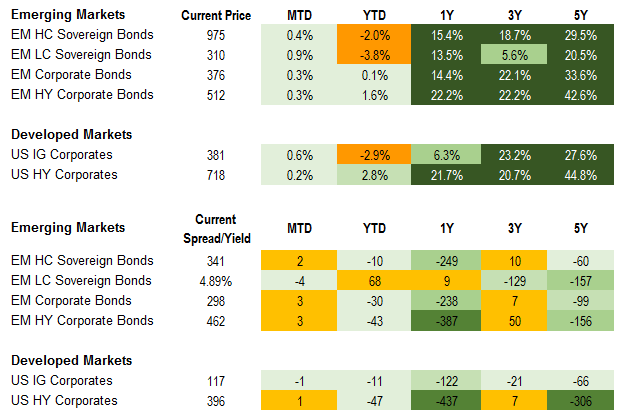
Equities
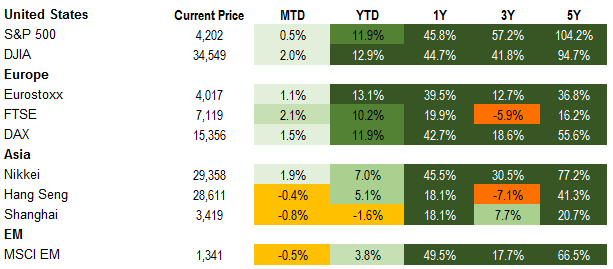
Commodities

Source for data tables: Bloomberg, JPMorgan, Gramercy. EM Fixed Income is represented by the following JPMorgan Indicies: EMBI Global, GBI-EM Global Diversified, CEMBI Broad Diversified and CEMBI Broad High Yield. DM Fixed Income is represented by the JPMorgan JULI Total Return Index and Domestic High Yield Index. Fixed Income, Equity and Commodity data is as of May 7, 2021 (Mid Afternoon).
Emerging Markets Weekly Highlights
Colombia’s tax reform drama and violent street protests increase the probability that the sovereign loses IG in 2021 and raises political risks ahead of congressional and presidential elections in 2022
Event: Colombia’s embattled President Ivan Duque was forced to withdraw for recalibrating a tax reform bill that his government submitted to Congress in mid-April. The proposal triggered significant political and social backlash, including sharp criticism from across the political spectrum and deadly street protests. In the midst of this week’s turmoil, Finance Minister Carrasquilla resigned. He was replaced by Jose Manuel Restrepo, a well-respected economist and Minister of Commerce, Industry & Trade in the Duque cabinet until now.
Gramercy Commentary: We see Restrepo as a moderate figure that has a good chance to find political consensus and push through a slimmed down version of the initial tax reform package. The new proposal will likely focus on the wealthiest members of society and the corporate sector while excluding VAT increases and attempts to broaden the tax base that triggered the violent street protests. However, a watered down version of tax reform is highly unlikely to address Colombia’s fiscal challenges. Having entered the pandemic with a stretched fiscal framework, the government is in dire need to increase budget revenues in the midst of an economic and social crisis in order to avert losing its cherished investment grade (IG) sovereign rating. We believe the rating agencies will continue to give Colombia the benefit of the doubt until they are able to assess if the fiscal framework going forward will remain “consistent with an IG rating”. However, time is short and pressure is high. We doubt that amid the current environment a severely weakened Duque Administration will muster the political capital to deliver fiscal measures sufficient to avert a downgrade later in the year. Beyond sovereign downgrade risks, we are even more concerned about the political/electoral outlook for 2022. Next year Colombia will be facing critical congressional and presidential elections and from a market point of view, Gustavo Petro, a left wing candidate who was already highly competitive in the 2018 elections, represents the main risk. To the extent current social discontent and anti-establishment sentiment translates into even stronger tailwinds for Petro as the elections get closer, markets will likely start to worry about possible material changes to Colombia’s historically prudent economic policy framework and direction. Furthermore, at present, Colombia is arguably the U.S. most loyal political ally and preferred partner in the region. As such, a seismic shift next year to the political (extreme) left under a potential Petro presidency in Colombia is likely to have political and economic repercussions of regional significance and an important impact on U.S. foreign policy priorities/anchors in Latin America.
Maduro government appoints opposition members to electoral council in aim to secure sanctions relief
Event: The government-controlled National Assembly appointed new members to the National Electoral Council (CNE) this week. Two of the five members are from the opposition: former lawmaker and Vice President of the National Assembly, Enrique Marquez and political activist and Advisor, Roberto Picón.
Gramercy commentary: The action appears to be a concession by the Maduro Administration and a positive step towards incremental sanctions relief from the U.S., potentially on fuel swaps. However, the development is unlikely to trigger meaningful change to the U.S. approach in the near term amid focus on other foreign policy strategies and domestic political considerations. While a more balanced CNE has been a long-time demand of the opposition, the development will likely further divide opposition forces on strategy ahead of local and gubernatorial elections due by year-end. Opposition leader Juan Guaido has referred to the council as fraudulent, while some moderate members may become more inclined to negotiate with the regime and participate in the elections.
South Africa’s suspension of ruling ANC Secretary General positive for Ramaphosa
Event: The ruling African National Congress (ANC) suspended its Secretary General and Ramaphosa opponent, Ace Magashule, following his refusal to voluntarily step down due to corruption charges.
Gramercy commentary: Magashule’s suspension is a win for Ramaphosa and broader governability as it should reduce his active undermining of the reform and policy agenda, particularly as wage negotiations heat-up. Nevertheless, there will likely be backlash among Magashule’s radical economic transformation (RET) faction that will need to be managed by Ramaphosa. In addition to the positive political momentum, fiscal performance has been better than anticipated largely thanks to the deepening cyclical recovery with a solid April PMI print (53.7 vs. survey of 50.5) and reduction in weekly issuance (R3.8bn from R4.9bn), helping to support local rates and FX. Going forward, the fiscal trajectory will depend on the ultimate outcome of wage negotiations and the sustainability of the economic rebound, which will be highly linked to external conditions and evolution of the virus and vaccine rollout in the near-term.
Binary market outlook for El Salvador as domestic political developments raise questions about the likelihood of a potential IMF program
Event: On its first day in office on May 1, the newly elected National Assembly, in which President Nayib Bukele’s Nuevas Ideas (NI) party holds a supermajority, replaced all Constitutional Court justices and the Attorney General. Some of El Salvador’s key international partners, most notably the U.S., issued strongly worded negative reactions expressing concerns about democracy and the rule of law in the country.
Gramercy commentary: Until the dramatic events that unfolded last weekend, El Salvador appeared to be well on track and in the final stages of negotiations with IMF staff over its first ever formal program with the Fund. Prospects of an IMF reform anchor and financing for El Salvador’s small and vulnerable dollarized economy have driven a strong rally in the country’s market assets since President Bukele’s party’s historic election triumph in late February. The narrative underpinning El Salvador’s market outperformance centered on the high likelihood of an IMF program supported by extremely strong governability by the Bukele Administration that would facilitate taking difficult policy decisions and delivering on IMF conditionality. In addition, investors viewed favorably the prospects of strong U.S. support for El Salvador in the context of the Biden Administration’s objective to control migration flows toward the U.S. southern border originating from the so-called “Northern Triangle” of Central America, to which El Salvador belongs. The El Salvadorian authorities made strong efforts this week to reassure global investors that the IMF program negotiations remain on track and U.S. diplomatic support remains strong. However, we have become concerned that cracks in the relationship between the Biden and Bukele Administrations in the context of this week’s events might prevent the U.S. foreign policy establishment from putting its full support behind an IMF program, or, at the very least, complicate the negotiations process going forward. Securing an IMF program by mid-year and embarking on a fiscal a consolidation path will be critical for the government’s ability to attract multilateral and market financing amid concerns about medium-term debt sustainability and the economic fallout from the pandemic.
Global emerging markets corporates in focus: COVID-19 – Still undefeated?
Event: Harrowing scenes broadcast from India and a resurgence of COVID-19 cases elsewhere have refocused minds on the still-raging battle against this virus. This has implications for emerging markets corporates.
Gramercy commentary: In an impromptu update, the Reserve Bank of India announced additional measures to address the impact of the surge in virus incidences including targeted help for the healthcare sector, liquidity facilities for banks and additional help for some borrowers. Other central banks and regulators may look to implement similar measures if faced with another wave of the pandemic. Lockdowns and movement restrictions tend to have the most direct impact on the travel, tourism and hospitality sectors. In the absence of extraordinary government help, corporates operating in these sectors may face revenue pressures. Asset quality at banks that lend to these corporates may also be at risk. For corporates which had comprehensive operational plans that worked effectively in previous waves of the pandemic, there may be fewer concerns. With government finances potentially under more pressure, support selectivity, which we have discussed in the past, may increase. This will make corporates’ standalone fundamentals even more important. Downgrades to growth estimates are also possible. S&P has already cut its 2021 estimate for India and other countries, such as Thailand, have adjusted forecasts for this year. This suggests that there are risks to loan and revenue growth, as well as profitability. Concerns about rating pressure are never too far away. While the rating agencies have recently noted that downgrade pressures have abated, negative actions could return if COVID-19 cases become a cause for concern once again. Added to this, some corporates may choose to delay bond issuance plans if countries where they are domiciled are battered with COVID-19 again.
Emerging Markets Technicals
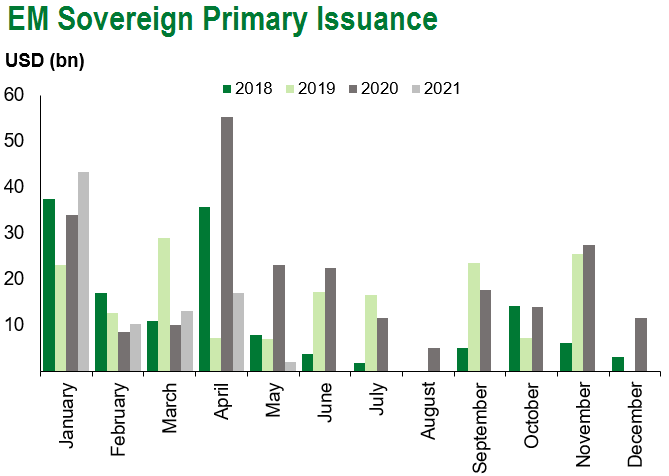
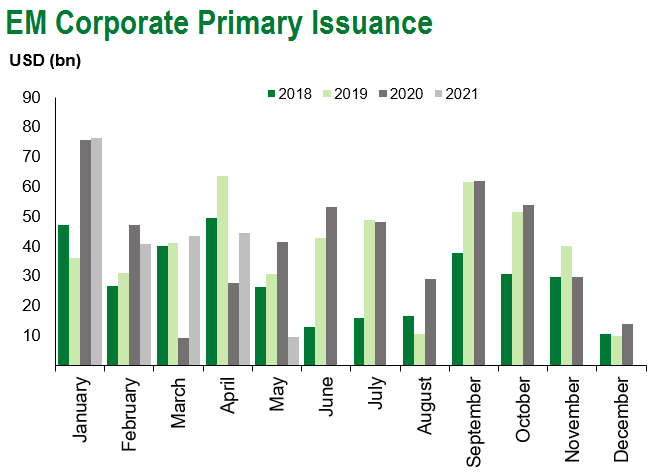
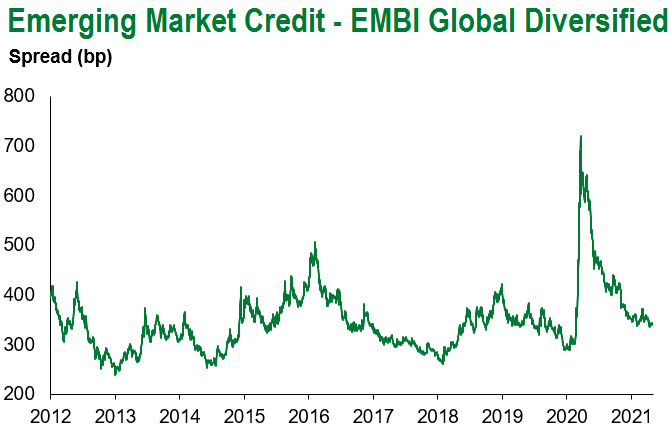
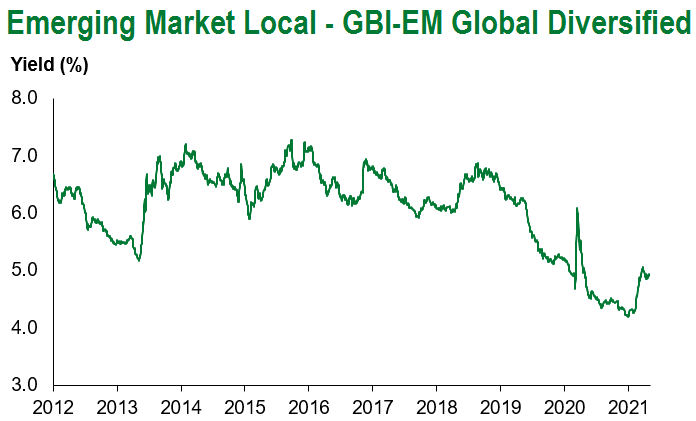
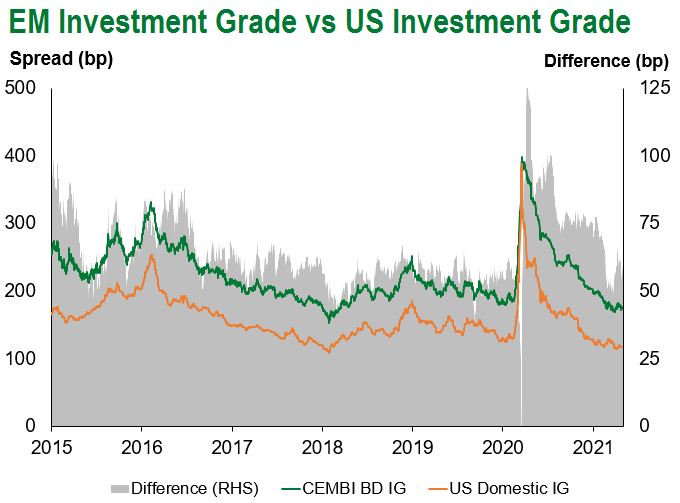
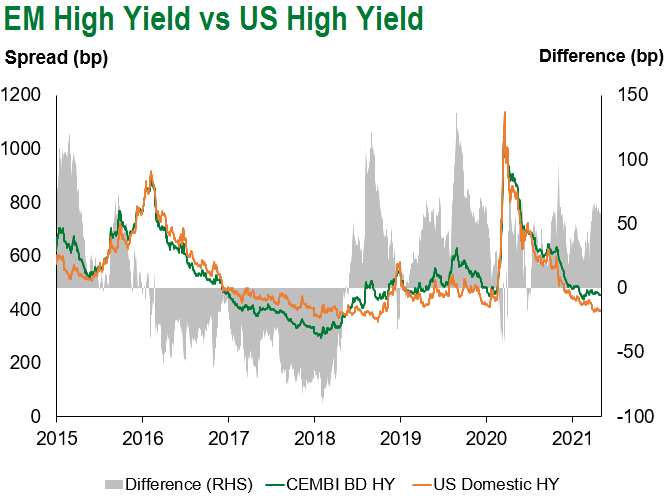
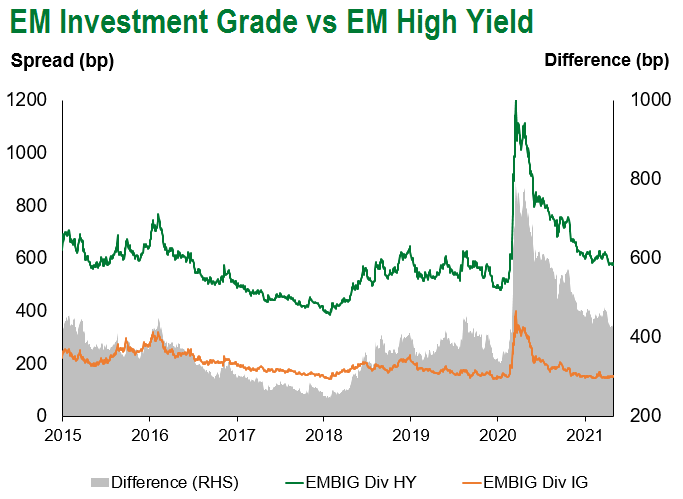
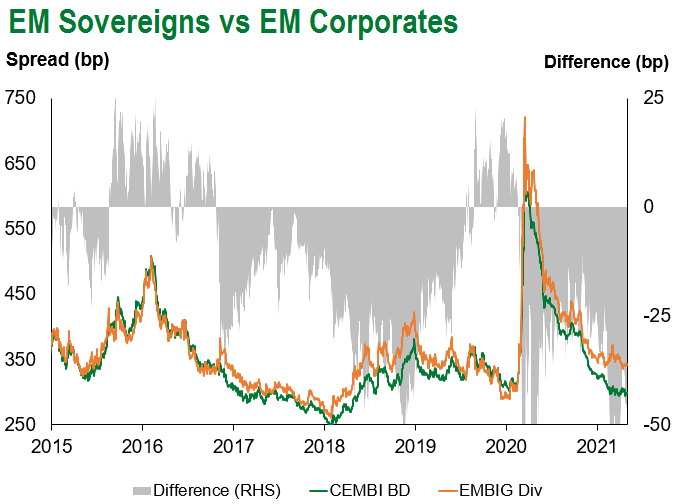
Emerging Markets Flows
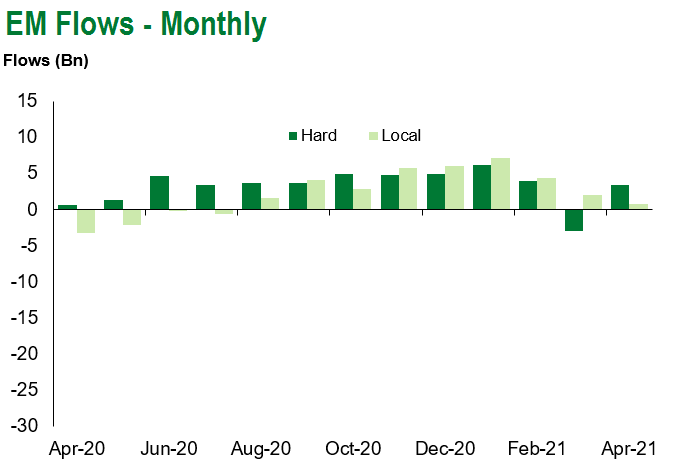
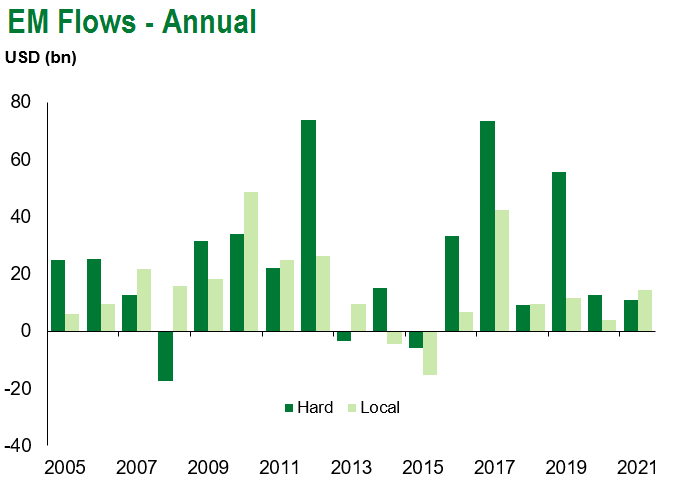
Source for graphs: Bloomberg, JPMorgan, Gramercy. As of May 7, 2021.
COVID Resources
Emerging Markets COVID-19 Case Summary
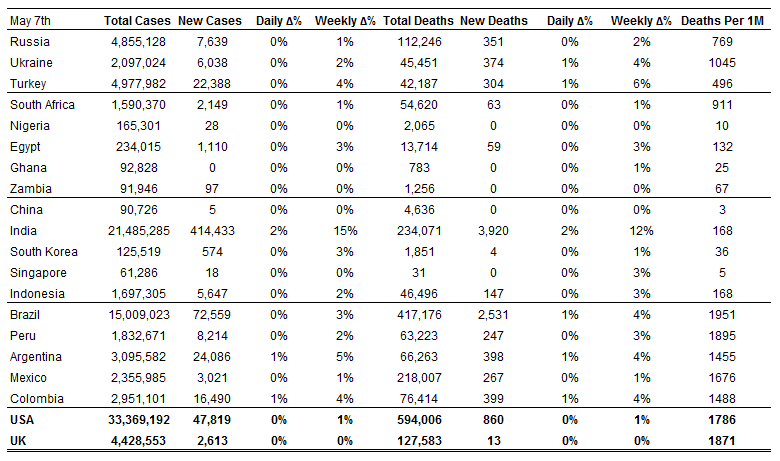
Source: Worldometer as of May 7, 2021.
Additional Crisis Resources:
Johns Hopkins COVID-19 Case Tracker
For questions, please contact:
Kathryn Exum, Senior Vice President, Sovereign Research Analyst, [email protected]
Petar Atanasov, Senior Vice President, Sovereign Research Analyst, [email protected]
Tolu Alamutu, CFA, Senior Vice President, Corporate Research Analyst, [email protected]
James Barry, Vice President, Corporate Research Analyst, [email protected]
This document is for informational purposes only. The information presented is not intended to be relied upon as a forecast, research or investment advice, and is not a recommendation, offer or solicitation to buy or sell any securities or to adopt any investment strategy. Gramercy may have current investment positions in the securities or sovereigns mentioned above. The information and opinions contained in this paper are as of the date of initial publication, derived from proprietary and nonproprietary sources deemed by Gramercy to be reliable, are not necessarily all-inclusive and are not guaranteed as to accuracy. This paper may contain “forward-looking” information that is not purely historical in nature. Such information may include, among other things, projections and forecasts. There is no guarantee that any forecasts made will come to pass. Reliance upon information in this paper is at the sole discretion of the reader. You should not rely on this presentation as the basis upon which to make an investment decision. Investment involves risk. There can be no assurance that investment objectives will be achieved. Investors must be prepared to bear the risk of a total loss of their investment. These risks are often heightened for investments in emerging/developing markets or smaller capital markets. International investing involves risks, including risks related to foreign currency, limited liquidity, less government regulation, and the possibility of substantial volatility due to adverse political, economic or other developments. The information provided herein is neither tax nor legal advice. Investors should speak to their tax professional for specific information regarding their tax situation.